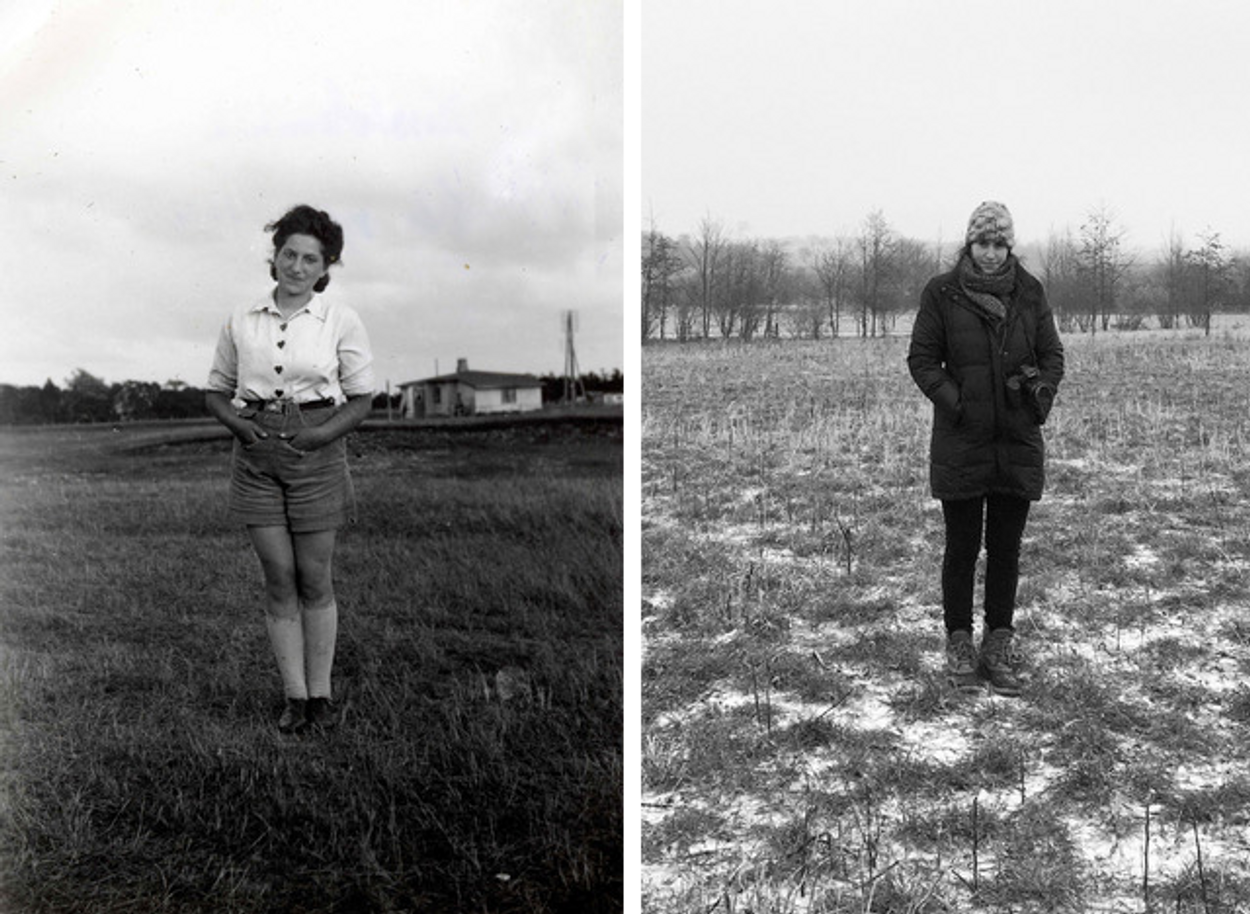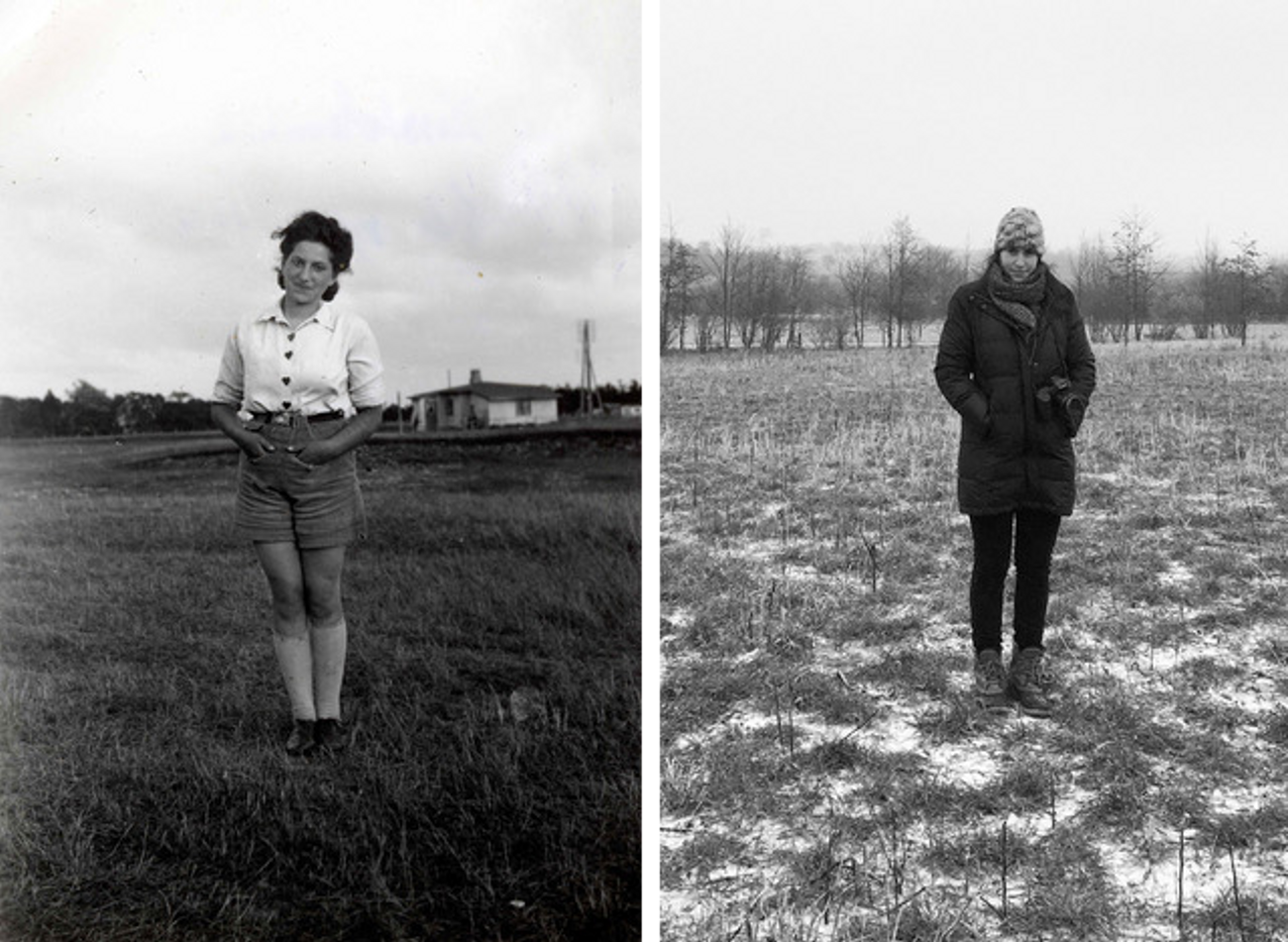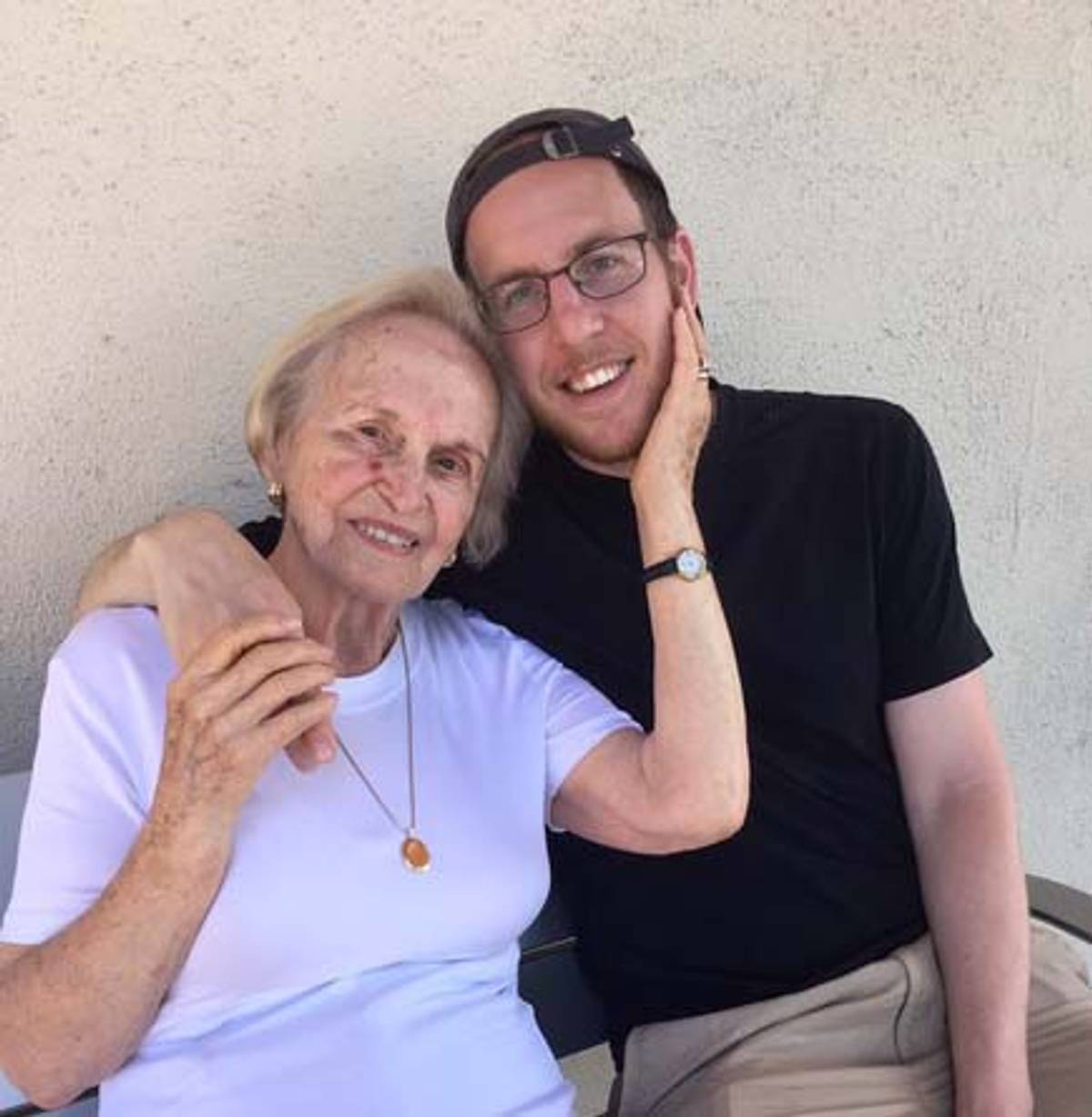The Next Generation
Grandchildren of Holocaust survivors continue to share their families’ stories




In 2009, when Rachael Cerrotti was a 20-year-old college student with dreams of becoming a photojournalist, she began conducting “informal storytelling sessions” with her grandmother Hana Dubova, believing one day she might utilize the material in some way. Cerrotti knew her grandmother’s life had been upended at age 13 by the encroaching 1939 Nazi invasion of her hometown Prague, and that Dubova was the only one in her family to survive the war—her younger brother and parents were murdered in the death camp Sobibor.
The sessions would become part of a much bigger project. After Dubova’s death in 2010, Cerrotti found, in her grandmother’s home, boxes upon boxes of detailed journals, diaries, letters, and photographs dating back to the 1920s—a “treasure trove” that led to a decadelong odyssey of immersion in her grandmother’s experiences. “I claimed my role as the unofficial family historian,” Cerrotti told me.
After four years of organizing and digitizing the extensive archive, Cerrotti sublet her Boston apartment and flew to Europe, retracing Dubova’s wartime journey throughout Denmark, Sweden, and the Czech Republic. “At one point,” she recalled, “I moved in with the descendants of the people who had saved my grandmother’s life.”
Cerrotti chronicled her grandmother’s story in a seven-episode narrative podcast produced for USC Shoah Foundation: We Share the Same Sky, which is being taught in classrooms worldwide, paired with companion educational resources. Her acclaimed memoir, also called We Share the Same Sky, was published last August.
There are many others out there on a similar path to Cerrotti. As the number of Holocaust survivors dwindles, and surveys of young Americans indicate a startling lack of knowledge about Holocaust history, a new generation—the so-called “3G,” or third generation—is stepping up to continue educating people about what happened to their grandparents.
“In the past couple of years we have seen a huge increase in inquiries both from individuals and dedicated third generation groups,” said Kori Street, interim executive director of USC Shoah Foundation. “Without them showing up, amplifying survivor stories and hosting events, we would not be able to fulfill the promise we made to the survivors who entrusted their stories to us: to keep them safe forever.”
There are regional groups around the country holding webinars, lectures, and other events, as well as recruiting and placing third-generation speakers in schools to share their grandparents’ histories. David Reckess, executive director of one such group called 3GNY-Descendants of Holocaust Survivors, said, “Our mission is to create a network of ‘3Gs,’ provide community and support for each other, and educate diverse audiences on the dangers of intolerance using our families’ stories as lessons.”

In his 2021 book By the Grace of the Game: The Holocaust, a Basketball Legacy and the Unprecedented American Dream, 38-year-old Dan Grunfeld interviewed both his father, Ernie, a former NBA player, and his nearly 97-year-old grandmother Lily—whom he calls Anyu, meaning “mother” in her native Hungarian tongue.The book details how, when Grunfeld was growing up, Anyu fed him both Hungarian dishes such as káposztás kocka (sautéed cabbage with noodles) and memories of her parents and five siblings who were exterminated at Auschwitz. Anyu survived by hiding in an attic in a Budapest ghetto.
Ernie was 8 when he, his parents, and his older brother Lutzi (who later succumbed to leukemia) immigrated to New York in 1964. Channeling his grief into sports, he ultimately became the only second-generation Holocaust survivor to play in the NBA—the number on his jersey, 18, signifying chai, the Hebrew word for life. The Knicks star also won an Olympic gold medal with Team USA in 1976. Dan Grunfeld inherited his father’s drive and talent for basketball, playing professionally, including for teams in Israel and Germany. (He joined the latter only after asking Grandma for permission.)
Grunfeld confided that his father, like many second-generation survivors affected by the weight of a traumatic family history, mostly kept his inner scars under wraps. “Being two generations removed, I have some distance, which helps alleviate some of the trauma,” said Grunfeld, “but it stays with you.”
Indeed, Grunfeld’s determination to both make the most of life’s opportunities and document the consequences of hatred gone unchecked lies in knowing he “has ancestors who never had a chance to live their dreams.”
His proud father participated in some publicity events for the book. The younger Grunfeld joked, “Come for stories about basketball; learn about the Holocaust.”
Keeping the past alive is a defining motif for Grunfeld, who speaks about the book and his family’s story at synagogues, JCCs, schools, and various Holocaust organizations both nationwide and internationally via Zoom: “My grandma always says, ‘If we don’t tell these stories no one else will and it could happen again.’”
“Only once the last generation disappears and we miss them do we try to connect to them, and learn about their pain and tragedy,” said Emanuel (Manu) Rosen. It wasn’t until 2002, a decade after his mother Mirjam’s death from cancer, that the now 69-year-old Israeli-born Rosen—who moved to Menlo Park, California, in 1983—began combing through a box of letters and documents his mother had left him. The material he found was connected to Mirjam’s seven-year legal battle against Germany to force the government to compensate the family for her father Hugo Mendel’s suicide in 1957.
Mendel jumped from a building in Tel Aviv two months after he and Mirjam’s mother, Lucie, returned from a visit to Hamm, Germany, which they’d fled in 1933 after the Nazis stripped then 42-year-old Hugo of a successful legal career and a sense of safety and belonging. Three and a half years earlier, Mirjam had been widowed, leaving her with two young children to raise on her own. (Rosen, the youngest, was 8 months.)
The ultimately successful lawsuit, detailed in Rosen’s 2021 memoir If Anyone Calls, Tell Them I Died, details the author’s all-consuming effort to understand his family’s history. He hired a German translator to interpret the 30 letters and postcards his grandparents had sent Mirjam during their trip, along with a thick folder of legal papers. The translator accompanied Rosen on a visit to his grandparents’ hometown.
Before this immersion Rosen felt little personal connection to the Holocaust. “Growing up, I didn’t understand my family was heavily affected,” he told me. He has come to appreciate that the term “survivor” isn’t just applicable to those who endured the ghettos and concentration camps and extermination of loved ones. “It was an uprooting. When my grandfather came to Palestine, he tried to start a business but couldn’t bring himself to go back to school and learn British law [in 1933 Palestine was ruled by Britain]. He was destroyed … My mother’s lawsuit proved he was a victim of the Holocaust.”
On a cork-covered bulletin board above his desk are important mementos such as a photo of his “Oma” (grandmother), a Hedgehog postcard his grandparents sent Rosen from their trip to Germany, and an enlargement of a stamp he got in Hamm featuring a saying by Fritz Bauer, the German Jewish judge instrumental in capturing Adolf Eichmann: “Nothing belongs to the past, everything still is present, and has the potential to become the future.”
Rosen finds it hugely rewarding to hear from people from around the world—including Germany—who are moved by his book. “People forget very quickly events that happened a decade ago, let alone 80 years. All we can do is keep talking about it.”
Publishing books and speaking in public about their grandparents’ experiences mark the beginning of a new path for these third-generation survivors. For instance, Cerrotti initially assumed publishing her grandmother’s story would be “the culmination” of this chapter in her life and she would move on from Holocaust storytelling: “It was the end of a project.”
But the ongoing wars occurring in the world—even prior to the tragedy in Ukraine—made it according to Cerrotti, “increasingly clear with every passing week that I need to be in this space right now. This story isn’t just relevant for the Jewish people.” What happened to our people over 80 years ago continues to hold invaluable lessons for the rest of the world.
The multimedia artist’s current role as the inaugural storyteller in residence for USC Shoah Foundation involves producing and hosting a new podcast called The Memory Generation. Debuting in May, it will utilize USC Shoah Foundation’s archive of 55,000 audiovisual testimonies to, as Cerrotti explained, “host conversations about the inheritance of memory and intergenerational storytelling.”
When Cerrotti becomes overwhelmed with the intensity of her work, she focuses on another legacy from her grandmother. “On her deathbed she asked herself, ‘Why did I survive?’ And I feel that in order to honor that question I have a responsibility to both let myself feel great joy within the life I lead and also great responsibility to help heal this world just as strangers helped my grandmother during the war.”
Sherry Amatenstein is a NYC-based psychotherapist, author, journalist, and child of Holocaust survivors.